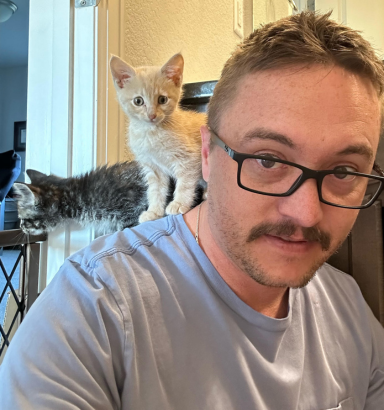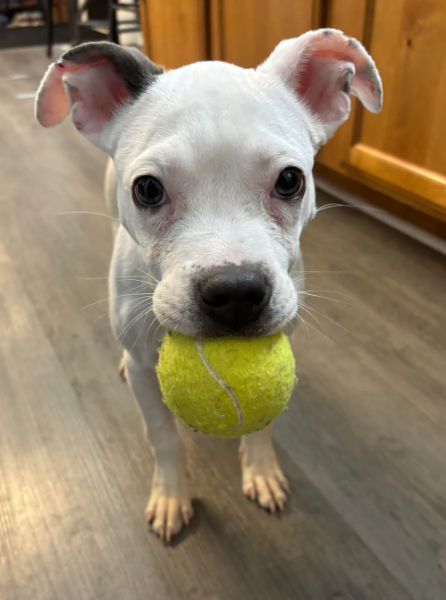Become a Foster Volunteer
Open your heart, open your home…
Are you an animal lover with a nurturing heart? We are seeking loving homes to provide temporary care for animals in need. Your support can help shape their futures!
d
Each year, NOCO Humane cares for hundreds of animals who need time to grow, recover from injuries/illnesses, or work on behavioral training before they can be placed for adoption. Our Foster Care Volunteers provide the love and nurturing these animals need to become healthy, adoptable pets.
d
Are you new to fostering animals? NOCO Humane provides all necessary training and guidance before you lovingly open your heart and your home to an animal in need.
Register Today!
Larimer Campus
Weld Campus
Who can be a Foster Volunteer?
Our Foster Volunteers come from all walks of life. This program is perfect for families, college students seeking hands-on animal experience, busy professionals who can’t commit to pet guardianship, senior citizens ready to put their experience to work, and for anyone who cares deeply for animals in need and are able to give them the TLC they need.
d
Foster volunteers must be at least 21 years of age to be the primary caregiver for foster animals in the home.
d
NOCO Humane provides all necessary training and preparation before your first assignment, and our Foster Team is available seven days a week, 24 hours a day for any questions or concerns that arise while you are fostering. While you are providing a life-saving service for animals in need, we want to ensure your experience is enjoyable!
We work around your schedule
If you are unavailable during a certain time, we totally understand! We will arrange a time-commitment around your lifestyle, work schedule, and vacation plans. If an emergency arises in your personal life while you are fostering an animal, let us know and we will certainly welcome the animal back to the shelter and find another foster placement. We know that life doesn’t pause when fostering begins, so let’s work together to make it all fit seamlessly!
We need assistance with temporary care for…
-
Kittens and puppies with their mother
-
Bottle-baby kittens and puppies without their mother who need round-the-clock care
-
Weaned kittens and puppies who need a few weeks to grow strong and make weight
-
Adult cats or dogs recovering from a treatable illness (e.g., upper respiratory infection)
-
Animals recovering from surgery
-
Animals in need of behavioral support to assist them with confidence building, manners, socialization, and other behavioral needs
Setting you up for success
Our Foster Team is dedicated to ensuring all foster volunteers are set up for success and enjoy what they’re doing. This support includes:
d
-
All supplies and nourishment are provided! Leashes, crates, food and containers, medical care, kennels, enrichment items, toys… you name it, if it’s a need for your foster, we will provide it
-
Access to open communication with our team seven days a week, 24 hours a day. No question is too small or too big, call us anytime and we’re always happy to provide the necessary information.
What we ask of you
-
Commit to taking a minimum of two foster cases per year
-
Follow all veterinary and behavioral protocols as outlined
-
Provide a safe, clean, and loving home environment (home inspections occur once a year)
-
If you already have pets in your home, your foster animal must be separated from your pets for the first two weeks. To prevent the possibility of disease spread, this ensures the safety and wellbeing of both your pets and your foster animal
Hear from our Foster Care Volunteers…
Initial steps to becoming a foster volunteer
-
Complete online registration and pay $30 fee (this helps cover the background check and support Foster Care Program overall)
-
Complete paperwork to ensure eligibility
-
Review online orientation video
-
Complete Animal Handling Training at one of NOCO Humane’s shelters
-
Final evaluation and survey with Foster Team
-
Complete Home Visit (required by state of Colorado) with a member of the Foster Team
Register Today!
Larimer Campus
Weld Campus
Frequently asked questions
Who can be a foster volunteer?
Our foster volunteers come from all walks of life. No experience is necessary; we will train you. Foster volunteers must be at least 21 years of age to be the primary caregiver for animals. This program is perfect for families, college students seeking hands-on animal experience, busy professionals who can’t commit to pet guardianship, and senior citizens looking to put their experience to work. Foster volunteers must be willing and able to drive foster animals to the shelter at least weekly for regular health and behavior checkups; therefore a valid driver’s license and proof of personal auto insurance is required. Click here to review our foster position description.
How do I become a foster volunteer?
Anyone interested in becoming a foster volunteer must attend a foster orientation, subsequent animal handling training (AHT), and foster care training classes. Additionally, our foster care coordinators conduct home visits with potential foster volunteers to ensure the environment is a good fit for foster placements. As part of the volunteer application process, each new volunteer must pay a volunteer fee of $30 to attend orientation. This fee goes towards administration fees, training, and a background check, as all volunteers submit to national criminal background checks and a sex offender search. Click here to sign up for Foster Orientation!
Do I need to provide any supplies?
NOCO Humane will provide you with food, leashes, litter, litterboxes, toys, etc.; however, we do appreciate if you are able to provide some supplies as needed. All items you purchase for foster animals are tax deductible to the full extent of the law. We ask that you provide a spare bedroom or bathroom for your foster animal to live in and that you plan to keep your owned animals separated from foster animals for at least two weeks. The shelter provides all veterinary care for foster animals.
Do I need special skills or training to be a foster volunteer?
Our program is designed to suit your experience and interest levels. Some animals require medications and veterinary treatment, and some just need a warm place to stay. We’ll work with you and your comfort level, provide the necessary training, and will always be available to answer your questions. All new foster volunteers start with fairly low-maintenance foster animals and work their way up to the more time-intensive foster experiences, if they wish.
What Types of animals need foster care?
Animals cared for in foster homes may include:
- Kittens with nursing queens
- Weaned kittens and puppies that need a few weeks to grow strong enough for placement
- Adult cats or dogs suffering from treatable illnesses such as upper respiratory infections or kennel cough
- Animals recovering from surgery that need care
- Animals needing patience, manners, socialization, confidence-building, or other behavioral support
- Bottle-baby kittens in foster homes that can support round-the-clock care
- Animals should the shelter face issues of overcrowding
**Because our Foster Care Volunteers need to focus their volunteer time on the many homeless animals in our care, NOCO Humane does not foster owned animals. If you are no longer able to care for your pet and would like to surrender him/her to us, please click here to learn more.**
How long will I be fostering an animal, and what kind of care is involved?
The average stay for a foster animal is three weeks, but some foster animals can require up to three months to recover from injury or illness. Some foster animals, like newborn kittens, require round-the-clock care. Puppies and kittens need structured socialization and basic manners training. Others, such as hamsters or birds, simply need daily attention. We’ll arrange a foster care time commitment around your lifestyle, work schedule, and vacation plans. We ask that you commit to fostering at least two cases per year. The foster care department offers periodic educational seminars relating to many aspects of animal care, including but not limited to, cat enrichment, puppy raising, and rabbit care.















































